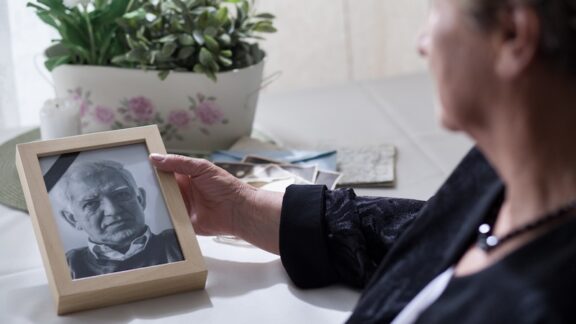If you’re mourning the death of a spouse, you may feel alone in your grief. Other loved ones, including friends and grown children, also feel the loss, but you have lost a life partner. Trying to come to terms with the reality of what that means for your daily existence – much less adjusting to it – can be devastating.
The loneliness can feel overwhelming and open the door to a health-damaging bout of depression. Trying to hold it all in can lead to a mire of self-absorbed grief. Meanwhile, as the lone remaining parent, what happens if your kids expect one-sided support in your time of need?
Helpful tips for grieving the death of a spouse
Veteran grief counselors share tips that will help you talk to your kids about what you’re feeling and best ask them for support.
Don’t wait to reach out
When it comes to coping with severe grief, trying to go at it alone is a bad idea. Period.
That said, it’s hard to flip the script and express extreme vulnerability to your grieving kids, especially when you’ve spent a lifetime playing the role of parental anchor.
“‘Action is the antidote to despair,’” writes grief counselor and Center For Loss & Life director Alan Wolfelt, quoting singer-songwriter Joan Baez. When someone you love dies, you need to mourn and heal “to renew your capacity to love. … But healing also requires the support and understanding of those around you as you embrace the pain of your loss.”
Asking for that support can feel scary. But putting it off and pushing loved ones away or withholding your emotions will only compound and prolong your pain. Withdrawing from your kids can also leave them with pernicious feelings of abandonment, worry, and confusion.
“Sharing your pain with others won’t make it disappear, but it will, over time, make it more bearable,” continues Wolfelt. “Reaching out for help also connects you to other people and strengthens the bonds of love that make life seem worth living again.”
Be honest about what you’re going through
 As loving parents, we tend to go to great lengths to avoid even the remote prospect of burdening our children. But after suffering the loss of a life partner, the same rules don’t apply. The grief can evoke intense pain and crippling disorientation.
As loving parents, we tend to go to great lengths to avoid even the remote prospect of burdening our children. But after suffering the loss of a life partner, the same rules don’t apply. The grief can evoke intense pain and crippling disorientation.
“Grief impacts us on every level of our being: emotional, psychological, physical, mental, spiritual, and social,” writes Boulder Psychological Services grief counselor Miki Fire. It’s normal to feel “overwhelming sadness or anger … numb and disconnected from the people in our lives … like we are going crazy … like we can’t breathe, can’t sleep, can’t eat … [or] like life is not worth living.”
The turbulence is exhausting and can make mundane to-do’s like shopping, doing laundry, and paying bills seem next to impossible. Watching yourself struggle to handle such basic tasks, in turn, can plunge you deeper into despair and lead to feelings of embarrassment.
But experts say you shouldn’t try to hide what you’re going through from loved ones, even in dealing with the death of a spouse.
“Family members should try to be open and honest with each other,” advises a peer-reviewed post on the American Cancer Society website. “This is not the time for [them] to hide their feelings to try and protect one another. … [You’re not] protecting your family and friends by not expressing your sadness.”
Do your best to talk with your kids directly about your loss. Try to share your sorrows and your experience of the life and death of your partner. Celebrate his or her memory. Allow your children to listen to what you have to say, comfort you, and tell stories of their own. Also discuss pragmatic matters you could use help with.
Chances are, the experience will be beneficial for everyone involved.
“Don’t feel bad about accepting the help [of your loved ones] right now,” writes Wolfelt, the Center For Loss & Life Transition director. “Sharing your inner thoughts and feelings of grief with compassionate friends and family members is one essential step toward healing.”
It also sets the tone for conversational openness and honesty moving forward.
Having trouble knowing what to say?
Grief is an inherently messy and confusing process that’s unique to each individual – and the effects are amplified by the depth of connection you felt for your lost loved one.
If the prospect of an off-the-cuff conversation with your adult kids feels daunting, experts suggest jotting down some thoughts about how you’re feeling and what you’d like to talk about in advance. You can also funnel them into a letter, then schedule a time to read it aloud to your children in a safe and calming space like the living room, patio, or garden.
While there’s no right or wrong way to mourn the death of a spouse, late pastoral psychologist, Bob Deits, offered the following example of how to ask for help and give your kids permission to help in his grief survival handbook, “Life After Loss”:
I have experienced a loss that is devastating to me. It will take time … for me to work through the grief I feel because of this loss.
I will cry more than usual for some time. My tears are not a sign of weakness or lack of hope. They are the symbol of the depth of my loss and the sign that I am recovering.
I may become angry without seeming to have a reason for it. My emotions are heightened by the stress of grief. Please be forgiving if I seem irrational at times. I need your understanding and your presence more than anything else. If you don’t know what to say, just touch me or give me a hug to let me know you care. Please don’t wait for me to call you. I am often too tired to even think of reaching out for the help I need.
If you have had an experience of loss that seems anything like mine, please share it with me. You will not make me feel worse. Thank you for caring about me. Your concern is a gift I treasure.
Related: Coping with the Loss of a Spouse





